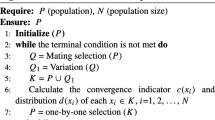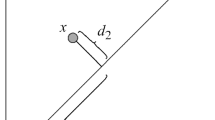Abstract
For large-scale multi-objective optimization problems, the trade-off between convergence and diversity brings significant challenges for researchers. Most of the reproduction operators in the evolutionary algorithms fail to achieve a superior performance. In order to address this issue, this work proposes a large-scale multi-objective evolutionary algorithm (LSMOEA) named LMOEA-IRIF. In the LMOEA-IRIF, a novel grouping strategy and an information feedback model (IFM) are designed to evolve the population. Specifically, the decision variables are clustered into multiple convergence-related and diversity-related subgroups based on their importance rankings. The importance rankings of decision variables are quantized by the maximum Euclidean distance between individuals generated in the objective space. Then the decision variables in each subgroup are optimized in a low-dimensional decision subspace, which can effectively speed up the convergence of population. Furthermore, the IFM, which takes the information from the previous generation into consideration, is devised to generate high-quality offspring and used to enhance the diversity of population. Comprehensive experiments are performed to validate the effectiveness of the LMOEA-IRIF. The experimental results show that the proposed algorithm obtains competitive performance in 56 of 76 benchmark instances against five state-of-the-art LSMOEAs.




















Similar content being viewed by others
References
Alcalá-Fdez J, Sánchez L, Garcia S, del Jesus MJ, Ventura S, Garrell JM, Otero J, Romero C, Bacardit J, Rivas VM (2009) KEEL: a software tool to assess evolutionary algorithms for data mining problems. Soft Comput 13:307–318. https://doi.org/10.1007/s00500-008-0323-y
Antonio LM, Coello CAC (2013) Use of cooperative coevolution for solving large scale multiobjective optimization problems. 2013 IEEE congress on evolutionary computation. IEEE, 2758–2765. https://doi.org/10.1109/cec.2013.6557903〹
Cao B, Zhao J, Gu Y, Ling Y, Ma X (2020) Applying graph-based differential grouping for multiobjective large-scale optimization. Swarm Evol Comput 53:100626. https://doi.org/10.1016/j.swevo.2019.100626
Cao J, Zhang J, Zhao F, Chen Z (2021) A two-stage evolutionary strategy based MOEA/D to multi-objective problems. Expert Syst Appl 185:115654. https://doi.org/10.1016/j.eswa.2021.115654
Cao J, Guo K, Zhang J, Chen Z (2023) A dual-stage large-scale multi-objective evolutionary algorithm with dynamic learning strategy. Expert Syst Appl 226:120184. https://doi.org/10.1016/j.eswa.2023.120184
Chen H, Ran C, Wen J, Li H, Jian W (2020) Solving large-scale many-objective optimization problems by covariance matrix adaptation evolution strategy with scalable small subpopulations. Inf Sci 509:457–469. https://doi.org/10.1016/j.ins.2018.10.007
Cheng R, Jin Y, Olhofer M (2017) Test problems for large-scale multiobjective and many-objective optimization. IEEE Trans Cybern 47:4108–4121. https://doi.org/10.1109/tcyb.2016.2600577
Deb K, Pratap A, Agarwal S, Meyarivan T (2002) A fast and elitist multiobjective genetic algorithm: NSGA-II. IEEE Trans Evol Comput 6:182–197. https://doi.org/10.1109/4235.996017
Gao W, Chan FT, Huang L, Liu S (2015) Bare bones artificial bee colony algorithm with parameter adaptation and fitness-based neighborhood. Inf Sci 316:180–200. https://doi.org/10.1016/j.ins.2015.04.006
Gong W, Zhou A, Cai Z (2015) A multioperator search strategy based on cheap surrogate models for evolutionary optimization. IEEE Trans Evol Comput 19:746–758. https://doi.org/10.1109/tevc.2015.2449293
He X, Guan H, Qin J (2015) A hybrid wavelet neural network model with mutual information and particle swarm optimization for forecasting monthly rainfall. J Hydrol 527:88–100. https://doi.org/10.1016/j.jhydrol.2015.04.047
He C, Li L, Tian Y, Zhang X, Cheng R, Jin Y, Yao X (2019) Accelerating large-scale multiobjective optimization via problem reformulation. IEEE Trans Evol Comput 23:949–961. https://doi.org/10.1109/tevc.2019.2896002
He C, Cheng R, Yazdani D (2022) Adaptive offspring generation for evolutionary large-scale multiobjective optimization. IEEE Trans Syst, Man, Cybern: Syst 52:786–798. https://doi.org/10.1109/tsmc.2020.3003926
Hong W, Tang K, Zhou A, Ishibuchi H, Yao X (2019) A scalable indicator-based evolutionary algorithm for large-scale multi-objective optimization. IEEE Trans Evol Comput 23:525–537. https://doi.org/10.1109/tevc.2018.2881153
Jinlu Z, Lixin W, Rui F, Hao S, Ziyu H (2022) Solve large-scale many-objective optimization problems based on dual analysis of objective space and decision space. Swarm Evol Comput 70:101045. https://doi.org/10.1016/j.swevo.2022.101045
Li M, Wei J (2018) A cooperative co-evolutionary algorithm for large-scale multi-objective optimization problems. Assoc Comput Mach. https://doi.org/10.1145/3205651.3208250
Li M, Yang S, Liu X (2014) Shift-based density estimation for Pareto-based algorithms in many-objective optimization. IEEE Trans Evol Comput 18:348–365. https://doi.org/10.1109/tevc.2013.2262178
Li L, Yen GG, Sahoo A, Chang L, Gu T (2021) On the estimation of Pareto front and dimensional similarity in many-objective evolutionary algorithm. Inf Sci 563:375–400. https://doi.org/10.1016/j.ins.2021.03.008
Li Y, Li L, Lin Q, Wong K-C, Ming Z, Coello CAC (2022) A self-organizing weighted optimization based framework for large-scale multi-objective optimization. Swarm Evol Comput 72:101084. https://doi.org/10.1016/j.swevo.2022.101084
Lin C-J, Chern M-S, Chih M (2016) A binary particle swarm optimization based on the surrogate information with proportional acceleration coefficients for the 0–1 multidimensional knapsack problem. J Ind Prod Eng 33:77–102. https://doi.org/10.1080/21681015.2015.1111263
Liu S, Lin Q, Wong K-C, Ma L, Coello CAC, Gong D (2019) A novel multi-objective evolutionary algorithm with dynamic decomposition strategy. Swarm Evol Comput 48:182–200. https://doi.org/10.1016/j.swevo.2019.02.010
Liu R, Liu J, Li Y, Liu J (2020) A random dynamic grouping based weight optimization framework for large-scale multi-objective optimization problems. Swarm Evol Comput 55:100684. https://doi.org/10.1016/j.swevo.2020.100684
Liu S, Lin Q, Tian Y, Tan KC (2021a) A variable importance-based differential evolution for large-scale multiobjective optimization. IEEE Trans Cybern 52:13048–13062. https://doi.org/10.1109/tcyb.2021.3098186
Liu S, Lin Q, Wong K-C, Li Q, Tan KC (2021) Evolutionary large-scale multiobjective optimization: benchmarks and algorithms. IEEE Trans Evol Comput. https://doi.org/10.1109/tevc.2021.3099487
Liu S, Jiang M, Lin Q, Tan KC (2022) Evolutionary large-scale multiobjective optimization via self-guided problem transformation. IEEE Congr Evol Comput (CEC). https://doi.org/10.1109/CEC55065.2022.9870259
Liu S, Lin Q, Feng L, Wong KC, Tan KC (2022) Evolutionary multitasking for large-scale multiobjective optimization. IEEE Trans Evol Comput. https://doi.org/10.1109/TEVC.2022.3166482
Liu S, Lin Q, Li Q, Tan KC (2022c) A comprehensive competitive swarm optimizer for large-scale multiobjective optimization. IEEE Trans Syst, Man, Cybern: Syst 52:5829–5842. https://doi.org/10.1109/TSMC.2021.3131312
Liu S, Li J, Lin Q, Tian Y, Tan KC (2023a) Learning to accelerate evolutionary search for large-scale multiobjective optimization. IEEE Trans Evol Comput 27:67–81. https://doi.org/10.1109/TEVC.2022.3155593
Liu S, Lin Q, Li J, Tan KC (2023) A survey on learnable evolutionary algorithms for scalable multiobjective optimization. IEEE Trans Evol Comput. https://doi.org/10.1109/TEVC.2023.3250350
Ma X, Liu F, Qi Y, Wang X, Li L, Jiao L, Yin M, Gong M (2016) A multiobjective evolutionary algorithm based on decision variable analyses for multiobjective optimization problems with large-scale variables. IEEE Trans Evol Comput 20:275–298. https://doi.org/10.1109/tevc.2015.2455812
Miguel Antonio L, Coello Coello CA (2016) Decomposition-based approach for solving large scale multi-objective problems. Int Conf Parallel Probl Solving Nat 921:525–534. https://doi.org/10.1007/978-3-319-45823-6_49
Omidvar MN, Li X, Yang Z, Yao X (2010) Cooperative co-evolution for large scale optimization through more frequent random grouping. 2010 IEEE congress on evolutionary computation. IEEE
Qi S, Zou J, Yang S, Zheng J (2022) A level-based multi-strategy learning swarm optimizer for large-scale multi-objective optimization. Swarm Evol Comput 73:101100. https://doi.org/10.1016/j.swevo.2022.101100
Qiao K, Yu K, Qu B, Liang J, Song H, Yue C (2022a) An evolutionary multitasking optimization framework for constrained multiobjective optimization problems. IEEE Trans Evol Comput 26:263–277. https://doi.org/10.1109/TEVC.2022.3145582
Qiao K, Yu K, Qu B, Liang J, Song H, Yue C, Lin H, Tan KC (2022) Dynamic auxiliary task-based evolutionary multitasking for constrained multi-objective optimization. IEEE Trans Evol Comput. https://doi.org/10.1109/TEVC.2022.3175065
Qin S, Sun C, Jin Y, Tan Y, Fieldsend J (2021) Large-scale evolutionary multiobjective optimization assisted by directed sampling. IEEE Trans Evol Comput 25:724–738. https://doi.org/10.1109/tevc.2021.3063606
Song A, Yang Q, Chen W-N, Zhang J (2016) A random-based dynamic grouping strategy for large scale multi-objective optimization. 2016 IEEE congress on evolutionary computation. IEEE, pp 468–475
Song Z, Wang H, Xu H (2022) A framework for expensive many-objective optimization with Pareto-based bi-indicator infill sampling criterion. Memetic Comput 14:179–191. https://doi.org/10.1007/s12293-021-00351-8
Tan KC, Feng L, Jiang M (2021) Evolutionary transfer optimization—a new frontier in evolutionary computation research. IEEE Comput Intell Mag 16:22–33. https://doi.org/10.1109/mci.2020.3039066
Tian Y, Cheng R, Zhang X, Jin Y (2017) PlatEMO: a MATLAB platform for evolutionary multi-objective optimization [educational forum]. IEEE Comput Intell Mag 12:73–87. https://doi.org/10.1109/mci.2017.2742868
Tian Y, Cheng R, Zhang X, Cheng F, Jin Y (2018) An indicator based multi-objective evolutionary algorithm with reference point adaptation for better versatility. IEEE Trans Evol Comput 22:609–622. https://doi.org/10.1109/tevc.2017.2749619
Tian Y, Zheng X, Zhang X, Jin Y (2020) Efficient large-scale multiobjective optimization based on a competitive swarm optimizer. IEEE Trans Cybern 50:3696–3708. https://doi.org/10.1109/tcyb.2019.2906383
Tian Y, Lu C, Zhang X, Tan KC, Jin Y (2021) Solving large-scale multi-objective optimization problems with sparse optimal solutions via unsupervised neural networks. IEEE Trans Cybern 51:3115–3128. https://doi.org/10.1109/tcyb.2020.2979930
Tian Y, Si L, Zhang X, Cheng R, He C, Tan KC, Jin Y (2022) Evolutionary large-scale multi-objective optimization: a survey. ACM Comput Surv 54:1–34. https://doi.org/10.1145/3470971
Wang G, Tan Y (2019) Improving metaheuristic algorithms with information feedback models. IEEE Trans Cybern 49:542–555. https://doi.org/10.1109/tcyb.2017.2780274
Wang X, Tang L (2016) An adaptive multi-population differential evolution algorithm for continuous multi-objective optimization. Inf Sci 348:124–141. https://doi.org/10.1016/j.ins.2016.01.068
Wang J, Zhang W, Zhang J (2015) Cooperative differential evolution with multiple populations for multiobjective optimization. IEEE Trans Cybern 46:2848–2861. https://doi.org/10.1109/tcyb.2015.2490669
Wang G-G, Lu M, Zhao X-J (2016) An improved bat algorithm with variable neighborhood search for global optimization. 2016 IEEE congress on evolutionary computation (CEC). IEEE, pp 1773–1778
Wang P, Xue B, Liang J, Zhang M (2022) Differential evolution based feature selection: a niching-based multi-objective approach. IEEE Trans Evol Comput. https://doi.org/10.1109/TEVC.2022.3168052
Wang X, Zhang K, Wang J, Jin Y (2022b) An enhanced competitive swarm optimizer with strongly convex sparse operator for large-scale multi-objective optimization. IEEE Trans Evol Comput 26:859–871. https://doi.org/10.1109/TEVC.2021.3111209
While L, Hingston P, Barone L, Huband S (2006) A faster algorithm for calculating hypervolume. IEEE Trans Evol Comput 10:29–38. https://doi.org/10.1109/tevc.2005.851275
Zhang Q, Li H (2008) MOEA/D: a multiobjective evolutionary algorithm based on decomposition. IEEE Trans Evol Comput 11:712–731. https://doi.org/10.1109/tevc.2007.892759
Zhang Q, Zhou A, Zhao S, Suganthan PN, Liu W, Tiwari S (2008b) Multiobjective optimization test instances for the CEC 2009 special session and competition. University of Essex, Colchester, pp 1–30
Zhang X, Tian Y, Cheng R, Jin Y (2018a) A decision variable clustering-based evolutionary algorithm for large-scale many-objective optimization. IEEE Trans Evol Comput 22:97–112. https://doi.org/10.1109/tevc.2016.2600642
Zhang X, Zheng X, Cheng R, Qiu J, Jin Y (2018b) A competitive mechanism based multi-objective particle swarm optimizer with fast convergence. Inf Sci 427:63–76. https://doi.org/10.1016/j.ins.2017.10.037
Zhang Y, Wang G-G, Li K, Yeh W-C, Jian M, Dong J (2020) Enhancing MOEA/D with information feedback models for large-scale many-objective optimization. Inf Sci 522:1–16. https://doi.org/10.1016/j.ins.2020.02.066
Zhou A, Jin Y, Zhang Q, Sendhoff B, Tsang E (2006) Combining model-based and genetics-based offspring generation for multi-objective optimization using a convergence criterion. 2006 IEEE congress on evolutionary computation. IEEE, pp 892–899
Zille H, Ishibuchi H, Mostaghim S, Nojima Y (2018) A framework for large-scale multiobjective optimization based on problem transformation. IEEE Trans Evol Comput 22:260–275. https://doi.org/10.1109/tevc.2017.2704782
Acknowledgements
This work was financially supported by the National Key Research and Development Plan under grant number 2020YFB1713600. It was also supported by the Science Foundation for Youths of Gansu Province (22JR5RA311). It was also supported by the Key Research and Development Program of Gansu Province under grant 22YF7GA130.
Author information
Authors and Affiliations
Contributions
Jie Cao: Conceptualization, Project administration, Funding acquisition, Supervision. Kaiyue Guo: Conceptualization, Methodology, Data curation Writing – original draft. Jianlin Zhang: Writing – review & editing, Funding acquisition, Supervision. Zuohan Chen: Visualization, Validation, Writing - review & editing.
Corresponding author
Ethics declarations
Competing interests
The authors declare no competing interests.
Additional information
Publisher's Note
Springer Nature remains neutral with regard to jurisdictional claims in published maps and institutional affiliations.
Rights and permissions
Springer Nature or its licensor (e.g. a society or other partner) holds exclusive rights to this article under a publishing agreement with the author(s) or other rightsholder(s); author self-archiving of the accepted manuscript version of this article is solely governed by the terms of such publishing agreement and applicable law.
About this article
Cite this article
Cao, J., Guo, K., Zhang, J. et al. A large-scale multi-objective evolutionary algorithm based on importance rankings and information feedback. Artif Intell Rev 56, 14803–14840 (2023). https://doi.org/10.1007/s10462-023-10522-3
Published:
Issue Date:
DOI: https://doi.org/10.1007/s10462-023-10522-3




